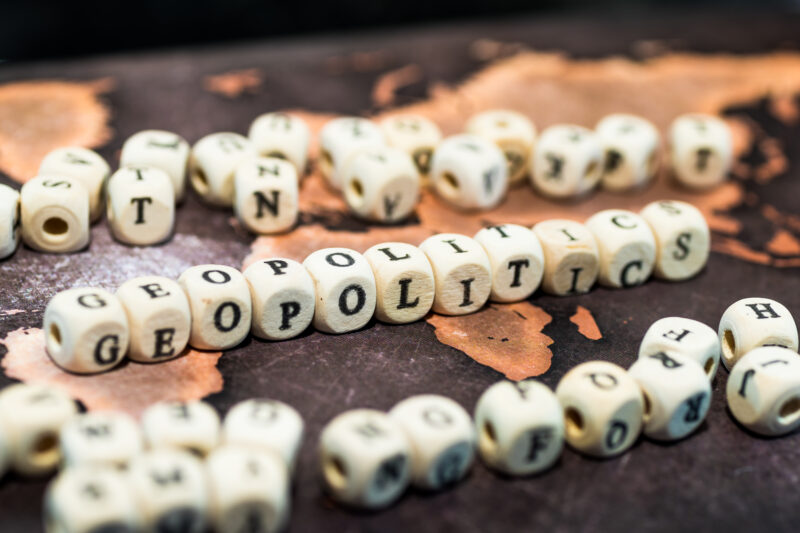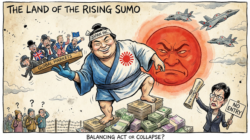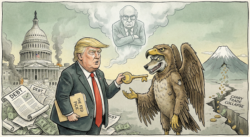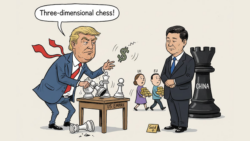Publisher’s Note: Today, author, entrepreneur, businessman, and investor James Altucher shares his take on President Trump’s tariffs. The mainstream view is that tariffs are bad.
But according to early data from the US government, the tariffs have already raised US$15 billion in revenue. Yes, some of the tariff costs will flow through to consumers. But are tariffs really as bad as the mainstream would have you think?
In our view, it’s too early to tell one way or the other. Although, it’s certainly caused market ructions. Time will tell whether the tariffs turn out to be good or bad. Until then, James Altucher…
My wife Robin just wanted some groceries.
Simple enough.
She parked the car for fifteen minutes, and returned to find a huge scratch on the side.
Someone keyed her car.
To be clear, this isn’t just any car.
It’s a Cybertruck—Elon Musk’s stainless-steel spaceship on wheels. She bought it back in 2021, before Musk became everyone’s favorite villain or savior.
Someone saw it parked in a grocery lot and felt compelled to carve their hatred directly into the metal.
That’s what happens when you stand out.
Nobody keys a beige minivan.
When you’re polarizing, you’re impossible to ignore. But the irony is: the more attention something has, the harder it is to find the truth about it.
What’s Elon Musk really thinking? What are his plans? What will happen with DOGE? Is he deserving of all of this adoration and hate? Hard to say.
Ideas work the same way.
Take tariffs, for example.
Tariffs have become the Cybertrucks of economic policy. People either love them or hate them. Even if they don’t understand what they are and how they work. (Most don’t.)
That’s why, in my latest podcast (link below), I wanted to explore the “in-between” truth about tariffs.
And like Cybertrucks, I guess my thoughts on tariffs are polarizing.
Greg Gutfield mentioned me on Fox News. Harvard professors hate me now. (I wonder if they also key Cybertrucks?)
The Truth About Tariffs
People love to panic about tariffs causing inflation.
They wave around the ghost of the Smoot-Hawley Tariff from the Great Depression like it’s Exhibit A proving tariffs equal economic collapse.
But let me pop this myth:
Tariffs don’t cause inflation. And no, I’m not crazy (despite what angry professors from Harvard or Stanford might tweet at me).
Here’s the deal.
Inflation isn’t when just a couple of things become pricier. It’s when your entire shopping basket—eggs, shirts, Netflix subscriptions, bananas, everything—starts costing more because your money’s worth less.
Inflation means your dollars aren’t stretching as far as they used to.
Take the 1800s.
For nearly a century, 97% of America’s revenue came from tariffs. Income tax? Didn’t exist. And guess what inflation was? Basically zero. Maybe 1% a year.
The economy was booming, and tariffs funded nearly everything. So, why do people suddenly think tariffs cause inflation today?
Tariffs are taxes on imports, yes, but prices are set by supply and demand—not tariffs.
Let me give you a simple example.
Imagine fancy potato chips from Canada cost $10, and a 20% tariff pushes that to $12. Everyone panics—prices rose! Inflation!
Nope.
If I only have $100 to spend and the price of my favorite chips goes up, I either stop buying chips or I buy, say, fewer newspapers.
If everyone stops buying newspapers because they’re overspending on chips, newspapers lower their prices or go out of business.
Overall spending stays the same, and inflation doesn’t budge.
Three quick scenarios:
- We buy pricier chips, but fewer other things: Inflation unchanged.
- Manufacturers shift to the U.S. to avoid tariffs: Inflation unchanged (and more jobs here).
- We stop buying fancy chips: Prices drop again. Inflation? Still unchanged.
The only thing that actually causes inflation is printing money.
Between 2020 and 2022 alone, 40% of all money ever created in history appeared overnight.
That’s why inflation shot up afterward—not because of tariffs.
Back to tariffs today.
Still No Inflation
Unlike the infamous Smoot-Hawley blanket tariff (imagine Oprah handing out tariffs: “You get a tariff, and you get a tariff!”), today’s tariffs are strategic.
Trump slapped tariffs on chips from Taiwan because we shouldn’t rely on a single foreign supplier for vital tech components—especially if that supplier might get invaded.
Now Taiwan Semiconductor is investing $100 billion in American manufacturing.
Strategic win, no inflation.
Then there’s Canada and Mexico—our friendly neighbors with weirdly huge tariffs on things like milk and butter (299% tariff on butter—really, Canada?).
Trump’s not blanketing everything with tariffs; he’s pressuring trade partners to lower theirs.
If they do, everybody wins. If they don’t, well, then we have a strategic trade chess game—but still no inflation.
In short, tariffs are about strategy, security, and fairness—not inflation.
Yes, blanket tariffs from the Great Depression era were dumb. Obviously. Today’s targeted tariffs? Smart.
Listen to the whole podcast to hear why I think this.
And by the way, if you see a Cybertruck, don’t key it. Robin doesn’t care about your politics; she just likes her weird truck.
Maybe read a good book, relax, and leave cars alone.
(And yes, nobody keys Volkswagens, even though they were basically created by Hitler. Strange world we live in.)
Click here for the full podcast.
Best,

James Altucher
Contributing Editor, Investor’s Daily
PS. The truth about tariffs is just one piece of the bigger story. There’s a major realignment happening—across trade, currencies, and global power—and most people are too distracted (or too emotional) to see it clearly. That’s why my colleague Jim Rickards put together what he’s calling the American Birthright. It’s a deep dive into what’s really shifting beneath the surface—and how you can not only protect your wealth, but potentially multiply it as the next financial era takes hold. I strongly recommend you check it out.
Place at the End
Bill Bonner, from the ranch in Gualfin, Argentina

“Death is not something to be feared. It is just a part of life,” the priest explained.
We were listening to the funeral oration for one of our workers who died suddenly last week. A young man, he got pneumonia… and then, on the way to the hospital, died of a heart attack.
“We do not fear death,” the Padre continued. “Because God let his only son die. We follow his example. And we do so in the knowledge that Jesus conquered death for us all. So, we die… but like our brother Jose… we will have eternal life.”
Thus had the priest spelled out the most dramatic promise of Christianity. People believe it. Still, they are in no rush to put it to the test. A young man steps on the gas. An older man knows where he will end up… he is in no hurry to get there. Jose was one of the young ranch hands who were on the job when we got here — nearly 20 years ago. He was 48 when he died.
For the benefit of new readers, we’ve come down to Argentina to check on farm properties, now run by our daughter and her husband. These were the result of trying to solve one problem by buying more of them. The first ranch never ran at break-even…so we bought another ranch next door. Fortunately, Argentina was in a financial crisis, so the amounts were not huge.
But we had to think of the future. We hoped to leave our children with a beautiful property that more or less paid for itself. But the two ranches, working together, still failed to produce a profit. So, we bought more farmland — but cropland this time, far to the East. There, the real estate is uninteresting…flat, fertile and productive. And there is enough rainfall to eliminate the expense of ‘regadors.’
‘Regadors’ are irrigators, who go around with shovels directing small rivulets of water throughout huge fields of alfalfa, corn, onions or other crops. Wages are very low here, but…they add up.
Typically, the older workers spend their days irrigating. The younger men, like Jose, are cowboys. They ride on horseback tending the herds. They are hearty men, ready to wrestle a calf to the ground…fight off condors…or puncture the intestines of a bloated cow.
Jose was a cowboy. Short and stocky, he was very strong and very fit. In one round-up, we watched him lasso a big cow, wrap the rawhide rope behind his back, and get pulled by the angry animal, skidding across the corral as though he were water skiing.
So, the news that he had died came as a shock. Along with relatives and friends, we hastened back to the ranch to say goodbye.
The little chapel held only about 50 people. It over-flowed. All of the mourners, except your editor and his family, appeared to be related. Dark skin, heads full of shiny black hair, it was as if the Spanish blood had never reached the valley. And maybe it didn’t. Our ranch is called ‘Gualfin’ — which means, the ‘place at the end.’ It is at 9,000 feet. Dry. Windy. And it backs up to a high desert that stretches over to Chile.
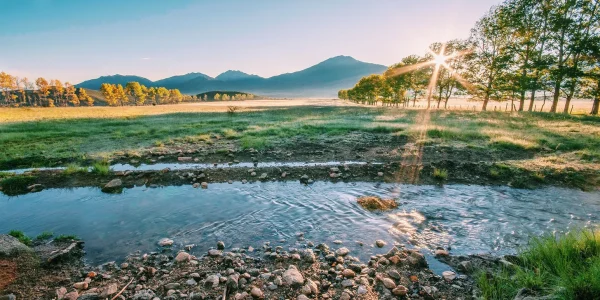 Image from the ranch at Gualfin
Image from the ranch at Gualfin
We’ve never actually seen the back of the ranch. We tried once. We mounted an expedition to ride on horseback, further up the valley and then over a mountain ridge to the desert. There, in the middle, is the ‘River of the Ducks,’ said to have the tastiest trout in the world. The ride was supposed to take about 24 hours. Our goal was to ride up, spend the night at a remote stone cabin, and then continue the next day onto the desert and to the river.
The trouble was, it was too late in the season. Overnight, the temperature dropped and everything froze. Not only that, but we were camped over 10,000 feet. In our late 60s, we couldn’t sleep. When the morning sun rose, we packed up and headed back down the valley.
Jose would have continued. He was a tough hombre.
After the mass was over, we piled into pick-up trucks and drove over to the soccer field. Jose had been a player and a fan. His teammates dug a hole on the field and buried his jersey. Horns honked. Hands clapped. And a cheer went up.
Next came the sad part. The cortege made its way to the ranch graveyard. Surrounded by a stout granite wall, in the winter months the graveyard looks like the most forbidding, least welcoming resting place you can imagine. A terminally sick man, seeing it in July, might want to hold on at least until September.
But yesterday, there was still a smattering of green grass and leafy bushes. The sky was clear — as it almost always is — and our Boot Hill didn’t look so bad.
Six jolly cowboys carried the coffin and laid it next to the grave. Until then, the poor widow, who is deaf, had appeared dazed, but sturdy. Then, she bent to the box and kissed it. She cried quietly and held fast. Then the sobs grew louder and more desperate.
Finally, a couple of cousins — for they are almost all cousins, nephews, uncles — pried her loose and held her tight. Then, came the sons…brothers…sisters…father… mother. Many of them needed the comfort of relatives — strong arms shored them up…gentle words cushioned the falling tears. We Episcopalians are taught not to show emotion in public. But with so much wailing, sobbing, and keening…all of it so authentic…so moving…even the North Americans in the group found their glasses fogging up.
One little boy, a nephew, was inconsolable. His father had to take him away from the gravesite.
When we had all sprinkled water on the coffin, some of Jose’s favorite things were laid on top — a lasso…and a flag from his soccer team. And the Padre, who had been watching events from the periphery, stepped forward. He pronounced the familiar words…from dust to dust…ashes to ashes.
The cowboys lowered him into the ground. We walked over, grabbed a handful of dirt, and tossed it onto the coffin as the grievers poured in bottles of wine, of coca cola, and whiskey. They tossed in cigarettes. And coca leaves. More of Jose’s favorite things.
“It is not exactly a Catholic custom,” the priest explained. “But here in the valley, we have always mixed a little bit of Pachamama with our religion.”
And then came the shovels…and the clods fell…quickly covering the coffin. One man shoveled for a while and then turned the tool over to someone else. It continued until the hole was filled. Rocks were placed on top…with a wooden cross at the head…and bouquets of flowers…so many that they practically covered the grave.
When all was in order, Jose’s father shouted out thanks to everyone who had come to say goodbye and announced a luncheon to follow at Jose’s house.
After sharing a meal of beef, potatoes and tomato salad, we expressed our regrets as best we could and took our leave. It was early evening… shadows were marching up the mountains to the south. And a cool wind was beginning to blow across the high plains.
Regards,

Bill Bonner
Contributing Editor, Investor’s Daily
For more from Bill Bonner, visit www.bonnerprivateresearch.com
